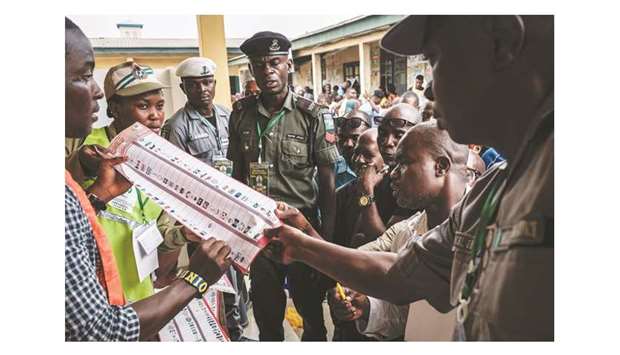Nigeria yesterday began counting votes in presidential elections even as many people had yet to even cast their ballot because of delays in the opening of polling units and problems with staffing and technology.
The late start at some of the nearly 120,000 polling stations around the country forced an extension to voting past the 2pm cut-off, just as others finished. In some places, voting materials did not arrive until mid-afternoon, according to election monitors, raising the prospect of voting continuing after dark.
Official results are expected from early next week, with the winner gaining control of Africa’s most populous nation and leading oil producer for four years.
The incumbent, Muhammadu Buhari, was one of the first to vote, and emerged from the polling booth in his home town of Daura, in the northwest state of Katsina, saying he was confident of victory.
“I will congratulate myself,” he told reporters. “I’m going to be the winner.”
His main challenger, Atiku Abubakar, 72, voted in Yola, in the northeastern state of Adamawa.
Shortly before polls opened, one soldier was killed and 20 others injured as Boko Haram fighters tried to infiltrate the northeastern city of Maiduguri but were repelled.
There were clashes elsewhere in Yobe and Borno states, including a rocket attack in the town of Gwoza. More than 500 Chadian troops were deployed as part of the regional force fighting Boko Haram as reinforcements.
An umbrella group of some 70 civil society organisations monitoring the vote said 16 people had been killed in election violence.
Nigeria’s Independent National Electoral Commission (INEC) last Saturday announced a one-week delay to the election, just hours before it was due to get under way.
That angered voters who had already travelled to their hometowns and villages to participate, and saw the main parties accuse each other of conspiring with the INEC to rig the result.
Neither produced evidence and the elections watchdog has worked round the clock to overcome difficulties in delivering materials, which it had blamed for the postponement.
INEC commissioner Festus Okoye said in some of Nigeria’s 36 states all polling stations opened on time.
But problems with electronic voter card readers and unspecified “security issues” caused delays elsewhere, he added.
In those places “there will be an extension of hours”, he said.
INEC’s logistical fine-tuning has been overshadowed by comments from Buhari that he had ordered security forces to be “ruthless” with vote-riggers and ballot-box snatchers.
Critics said his warning was a “licence to kill” to the police and the military, while Abubakar said his comments did not befit an elected head of state.
Buhari has since sought to reassure voters, promising an “atmosphere of openness and peace, devoid of fear from threat or intimidation”.
Analysts SBM Intelligence say 233 people were killed in 67 incidents of election-related violence from last October to Friday — an average of two people per day.
In southern Rivers state, unknown gunmen shot dead a prominent local member of Buhari’s All Progressives Congress party and his brother, police said.
There were also sporadic incidents of snatching election materials, said police spokesman Nnamdi Omoni.
Similar incidents were reported elsewhere but most voting was peaceful.
The election campaign came against a backdrop of wider violence from Boko Haram and criminal gangs in the north that have killed more than 200 people this month alone. Analysts said that and the delay could hit turn-out.
A total of 72.7mn people with voter identity cards were eligible to vote.
Parliamentary elections were held at the same time.
In 2015, former military ruler Buhari became the first opposition candidate in Nigerian history to defeat a sitting president, beating Goodluck Jonathan by 2.5mn votes.
Buhari has again vowed to be tough on insecurity and corruption, and wants to complete much-needed road and rail infrastructure projects, as well as social mobility schemes.
Abubakar is a pro-business free marketeer whose main pledges have been to privatise giant state-run companies and float the embattled naira currency.
Nigerian elections have previously been characterised by voting along ethnic and religious lines.
But with Buhari and Abubakar both northern Muslims, that could split the northern vote, making southern states a key battleground.
Opponents have accused Buhari of trying to manipulate the judiciary that would rule on any dispute about the results, after he suspended the chief justice this month.
Nigeria’s Business Day newspaper on Friday said whoever wins has to repair a “broken economy” limping back from recession, and hit by high unemployment, inflation and weak growth.

Officials count votes in front of voters during the presidential and parliamentary elections at a polling station in Port Harcourt, southern Nigeria.
